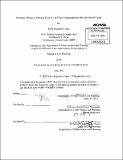| dc.contributor.advisor | Balakrishnan Rajagopal. | en_US |
| dc.contributor.author | Lopez, Sofia Alejandra | en_US |
| dc.contributor.other | Massachusetts Institute of Technology. Department of Urban Studies and Planning. | en_US |
| dc.coverage.spatial | f-ua--- | en_US |
| dc.date.accessioned | 2013-10-24T17:39:25Z | |
| dc.date.available | 2013-10-24T17:39:25Z | |
| dc.date.copyright | 2013 | en_US |
| dc.date.issued | 2013 | en_US |
| dc.identifier.uri | http://hdl.handle.net/1721.1/81650 | |
| dc.description | Thesis (M.C.P.)--Massachusetts Institute of Technology, Dept. of Urban Studies and Planning, 2013. | en_US |
| dc.description | Cataloged from PDF version of thesis. | en_US |
| dc.description | Includes bibliographical references (p. 105-114). | en_US |
| dc.description.abstract | The last decade in Egypt has witnessed significant innovations in the structure of social organizations spurred by the fraying of central government legitimacy. Within this dense network of new social actors independent labor unions have emerged as some of the more innovative groups, commanding material assurances and institutional change from firms and on occasion central and municipal governments. Understanding how this happens entails a historical view of Egypt's political economy, and the changes engendered by a succession of leaders beginning in 1952. The Nasser leadership in many ways constituted a reaction to the dynamics of colonialism, though much of Egypt's history since has been similarly premised on negotiating relationships with foreign creditors and domestic demands. In the face of these complex relationships there are and have been a set of local actors successfully making claims and influencing the state in spite of the popular reading of an ironclad regime, impervious to social influence. Building on labor action and social movement theory, the limitations to the sites and kinds of institutional change enacted by workers are clear. Nonetheless, in Egypt these groups are acting in new and surprising ways, defying assumptions about group identity, building strategic partnerships with related religious and pro-democratic organizations, and exerting pressure on a variety of state institutions. This thesis seeks to understand the strategic choices these unions are employing in recruitment, negotiation, and direct action and in particular their relationships to other movements. | en_US |
| dc.description.statementofresponsibility | by Sofia Alejandra Lopez. | en_US |
| dc.format.extent | 114 p. | en_US |
| dc.language.iso | eng | en_US |
| dc.publisher | Massachusetts Institute of Technology | en_US |
| dc.rights | M.I.T. theses are protected by
copyright. They may be viewed from this source for any purpose, but
reproduction or distribution in any format is prohibited without written
permission. See provided URL for inquiries about permission. | en_US |
| dc.rights.uri | http://dspace.mit.edu/handle/1721.1/7582 | en_US |
| dc.subject | Urban Studies and Planning. | en_US |
| dc.title | Dynamic alliances : political economy of labor organization in post-revolution Egypt | en_US |
| dc.title.alternative | Political economy of labor organization in post-revolution Egypt | en_US |
| dc.type | Thesis | en_US |
| dc.description.degree | M.C.P. | en_US |
| dc.contributor.department | Massachusetts Institute of Technology. Department of Urban Studies and Planning | |
| dc.identifier.oclc | 859603825 | en_US |
